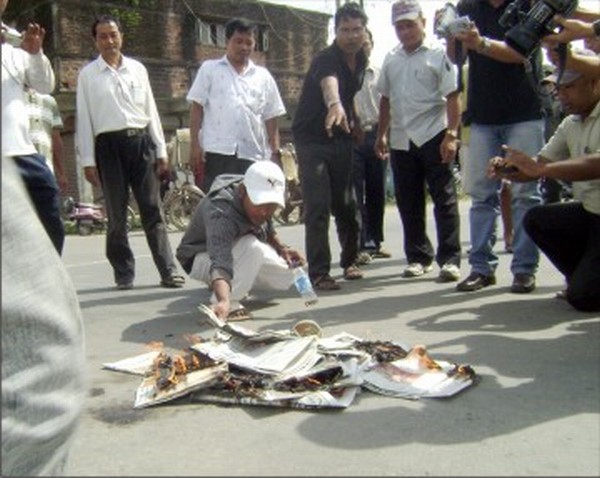Telegraph banned for Irom Sharmila report
Source: The Sangai Express / NNN
Imphal, September 06 2011:
The Telegraph daily newspaper has been banned in Manipur for an indefinite period by civil society organisations under the aegis of Apunba Lup from today.
Copies of The Telegraph newspapers were also burnt in several parts of Imphal today.
Today's development was prompted by the publication on hunger striker Irom Sharmila's private life.
Civil society organisation leaders said they are angry because in the last 11 years of Irom Sharmila's agitation the national media refused to focus her on the front page but on Monday's edition of The Telegraph the daily used the news item on private life of the hunger striker as the main news of the day.
"There is a conspiracy by the national daily to sabotage the movement of Sharmila who is demanding the repeal of Armed Forces Special Powers Act," said one Apunba Lup leader.
The Apunba Lup also said that it is very difficult to meet Irom Sharmila and questioned "how come a reporter from New Delhi just came and met the hunger striker that easily" .
It also questioned who gave the permission to The Telegraph reporter.
"It is an insult to the whole of Manipur people," fumed the Apunba Lup leaders.
|
After minutely discussing the matter, Apunba Lup leaders met the media at Manipur Press Club this afternoon.
They said unless the Editor of The Telegraph come down to Imphal and apologise, the ban on The Telegraph will continue.
About 8000 copies of The Telegraph circulate in Manipur daily, according to reports.
Meanwhile, reports said copies of The Telegraph were also burnt in several places by different organisations in the State capital today.
Senior Citizens for Society has also come out strongly against the report.
Volunteers of Humanitarian Development Committee, Keishamthong Kendra today burnt copies of the newspaper to denounce the report as biased, fictitious and malicious.
Speaking to newspersons at the Nagamapal RIMS Road office of Senior Citizens for Society, its president N Binoy said while the Kashmir issue and the recent hunger strike by Anna Hazare against corruption in high places figure prominently in Parliament, Irom Sharmila's democratic movement for nearly 11 years to repeal AFSPA from Manipur has been trashed.
Binoy rubbished the report carried as the lead story in the Telegraph as flimsy and intent on diluting her campaign.
Posing as to why and how the journalist from outside was allowed to interview Sharmila in the security ward when repeated appeals by the Society had been turned down by the authorities concerned, Binoy did not rule out conspiracy involving the Government of Manipur and agents of the Centre.
Echoing similar sentiment, advocate Khaidem Mani, who is also a functionary of the Senior Citizens for Society, desired that high-handedness of security forces under the immunity granted by AFSPA 1958 should have been adequately reported by the national daily rather than focus on private/personal matter of the anti-AFSPA campaigner.
Other members of the Society, who were also present during the media briefing, conveyed their support to the forthcoming nationwide movement in support of Sharmila's campaign against the draconian law.
Meanwhile, women activists under the aegis of Humanitarian development Committee, Keishamthong Kendra set aflame copies of The Telegraph in protest against the report on Sharmila's personal matter.
speaking to newspersons on the sideline of the protest at Kwakeithel Bazar this afternoon, Committee president RK Shivchandra observed that the report was intentionally published to discourage the proposed visit of Anna Hazare to Manipur.
Lamenting that over a decade long campaign of Sharmila had remained in the backdrop of national dailies only to occupy a place of prominence when the issue concerned her private matters, he maintained that the report is an affront to the entire population of Manipur.
Shivchandra also declared that until and unless The Telegraph tender an unconditional apology, the newspaper should not be circulated in the State .








